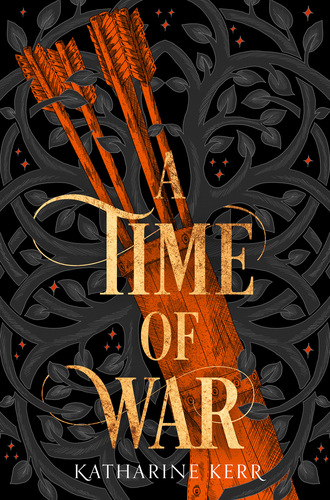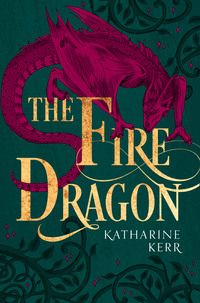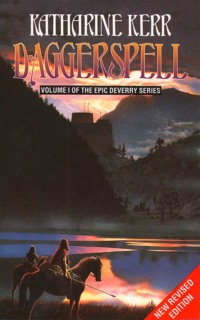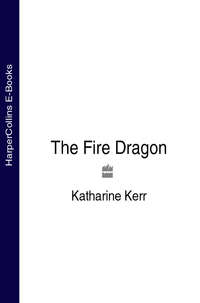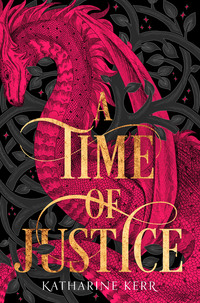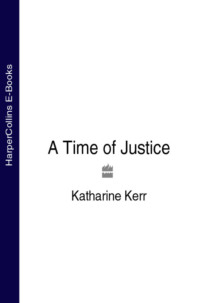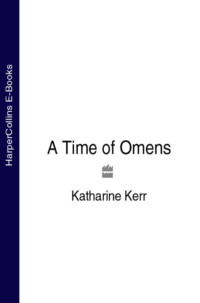It was getting on late in the afternoon when the river, which had turned due east, grew suddenly wider, suddenly shallow. They might be drawing near to the ford Evandar had told them about, Jahdo supposed. He was beginning to think of finding them a campsite, when the boy saw black specks wheeling against the sky at some distance and, as far as he could tell, anyway, on the other side of the river. Meer stopped walking.
‘What’s that?’ he snapped. ‘Do you see birds? I hear them calling a long way off.’
‘I can see them, sure enough. There be a lot of them. I don’t know what kind they are. They fly too far off, but they look really little, not like mazrakir.’
‘Good. Well, let’s see what they’re up to. Lead on.’
Some yards on they came indeed to the ford, and on their side tall white stones marked its spread, just as Evandar had told them. Although the water ran shallow enough for Meer and the horses, Jahdo had to pick his way across the rocky bottom in water up to his waist, but he didn’t dare ride one of the pack animals and leave Meer to guide them. Since the river fed off the mountain snowpack, he was chilled deep by the time they scrambled onto the grassy bank at the far side. Meer felt his damp tunic, then laid the back of one furry palm against the boy’s cheek.
‘We’d best keep walking. Warm you up a little.’
‘Well and good, then. Do you still want to see what those birds are?’
‘I do. I have dread round my heart, but I must know the truth.’
Meer’s fear turned out to be more than justified. As they travelled on, heading more south than east, the distant bird cries resolved themselves into the harsh cawing of ravens, wheeling and dipping over some unknown thing.
‘It might just be a dead deer,’ Jahdo said.
Meer only grunted for an answer and strode onward, swinging his stick back and forth before him like an angry scythe. After some hundred yards the horse and mule suddenly tossed up their heads and snorted. Their ears went back and they danced, pulling on their lead-ropes.
‘Oh by the blessed name of every god,’ Meer whispered. ‘Do you smell that?’
‘I can’t. What?’
‘Count your human weakness a blessing, then. It’s the smell of death, much death, death under a hot sun.’
Jahdo felt his stomach clench.
‘Let’s go back a-ways and leave the horse and mule behind. Jahdo, forgive me. If I could go on alone and spare you what’s sure to lie ahead, I would, because you’re not a Gel da’Thae colt, raised to this sort of thing, but without you, how can I tell if my brother lies there or not?’
‘Well, true spoken. I’ll try to help.’
They retraced their steps a-ways and found a good campsite near the river, then unloaded and tethered the animals. Meer had Jahdo find pieces of old rag, soak them in water, and tie them round their noses and mouths before they set out again. As they walked, Meer prayed, a low rise and fall of despair.
First the sound of the birds, and all too soon the stupefyingly foul smell of rotting flesh, led them down the grassy bank, then east of the river for some hundred feet. The land there rolled back rising from the river to a high wooded knoll that climbed like a grave-mound behind the carnage. For a long time Jahdo could only stare at what he saw; every time he tried to speak he gagged from the smell. The air bludgeoned him, even through his pitiful mask; it shoved a dirty fist down his throat; it wrenched at his stomach with filthy fingers. Yet he was too horrified to vomit, which was perhaps the worst thing of all. I have to go through with this, he told himself over and over. What if it were Kiel lying dead there? How would I feel then? I’ve got to be Meer’s eyes. At last he convinced himself into courage, and he could speak.
‘Meer, there’s a flat space, like, and it’s all covered with dead men. They’re not buried or anything. They do just lie there, and they be all puffy. And the birds do crawl all over them like ants. The birds keep fighting with each other, and that’s why they keep squalling and flying.’
‘Indeed.’ Meer’s voice was very thin but steady. ‘How many men?’
‘Oh, lots and lots. They’re all human beings. Off to the north there’s an overturned wagon. It be all broken, and there’s someone really tall lying by it.’
‘I hate to ask you this, lad, but can you bear to lead me there?’
‘I’ll try.’
Fortunately they could skirt the edge of the battlefield rather than walk across it, but even so, Jahdo was caught by the horror and found himself staring at the corpses. He would never forget that sight, not as long as he lived, of bodies heaped and tumbled like firewood, broken, slashed, tangled, left there for wild things in a last gesture of contempt. Whenever the singers back in Cerr Cawnen had told lurid tales of battlefields, they’d always spoken of red blood and deathly silence. Here all the bodies lay grey and swollen, streaked with the black of dried blood or the dull maroon colour of torn flesh where the birds were feeding. The field itself pulsed with life and noise as ants swarmed, ravens screamed and chattered, broke to fly only to circle and settle again, while under it all sounded the vast drone of thousands of flies.
‘I think they were killed with swords. There lie hoof-prints all round, too, and a couple of dead horses, but only a couple. Oh wait, here’s an arrow, just lying here.’
Although the shaft was broken, the point was mercifully clean. When Jahdo stooped down, he saw the tiny pawprints of foxes on the horribly moist ground – no doubt they crept up at night to share this banquet. He concentrated on the arrow, picked it up and ran his fingers down the wood.
‘I’ve never seen an arrow so long. When it were whole it must have been longer than my arm, and the feathers are from some kind of blue bird.’
‘None of my people would loft a thing like that.’ Meer was whispering. ‘Ah, evil evil evil come upon us!’
Jahdo wanted to agree, but he didn’t dare risk speaking for fear he’d sob aloud. Between them and the wagon lay a scatter of corpses, as if they were a few sticks of wood tossed in the eddy of this river of death. A young man lay on his back, his head tilted at an unnatural angle, his eyes pools of slime in a bloated grey face. The body of a comrade lay slung over his legs. Nearby lay an arm, torn clear off and as grey as stone, with the bone exposed and picked clean all down the wrist. Flies crawled between the fingers.
‘Meer, watch out!’ Jahdo’s voice came out all strangled. ‘Step round to your right.’
‘Very well.’ Meer was tapping with his stick, but gingerly, afraid no doubt of what he might touch. ‘Lad, what are these dead men wearing?’
‘Some of them aren’t really dressed at all. The others have shirts with big sleeves and these leather vest things, and trousers that come all the way to their ankles, and there’s these thong things that tie them in.’
Meer whimpered in a way that said he recognized this garb.
They came at last to the overturned wagon and the enormous warrior stretched out beside it. At their approach a scatter of ravens shrieked and flew, but someone had dropped a cracked shield over the man’s face and folded his arms over his chest, too, with a cloak upon his hands, so that the birds had barely got a start on him. When Jahdo described these scant signs of respect, Meer made a long keening sound under his breath.
‘What does that shield look like?’
‘Well, it be wooden, and sort of egg-shaped, and white-washed. In the middle there does lie this circle of metal with funny designs on it, and down at the bottom someone’s scratched this little picture that I guess is supposed to be a dragon.’
‘A little more detail, if you please, about that metal plate.’
‘Well, the design runs in circles, and one’s like when you braid a horse’s tail, three strands, and then there’s one that’s like a lot of knots, like someone did tie all these sheep-shank knots in a long rope but then never did pull them tight.’
Meer shrieked.
‘Slaver work, may the gods all help us! Can you bear to lift the shield, lad?’
Gagging profoundly, Jahdo used the broken arrow to hook the shield rim and shove it to one side. At the motion it broke in half, the pieces sliding apart. All puffed with heat-rot a huge distorted face looked up with eyes glazed and milky. His mane of coarse black hair lay tangled and clotted with dried blood, which also streaked one tattooed cheek.
‘Meer, I be sorry. He be Gel da’Thae.’
Meer tossed back his head and howled, a cry of such pulsating agony that all round the ravens flew, flapping indignantly in circles overhead as the bard shrieked again and again, clutching his staff in both hands and raising it high as if to lay his plaint before the very gods themselves. Thanks to Meer’s teaching of the lore, Jahdo knew that the charms and amulets braided into Thavrae’s hair were for his protection in the Deathworld and had to remain with him. The cluster of talismans on the thong round his neck, however, needed to go back to his kin. On the edge of vomiting Jahdo drew the knife his grandfather had given him, knelt down, and cut the thong while Meer’s rage and grief swirled round him like a storm. When Jahdo yanked the talismans free, the head flopped to one side. Retching and gagging, he stood up fast, shoving the charms into his pocket.
‘Meer, Meer!’ He grabbed the bard’s arm. ‘It’s needful for us to get out of here. We don’t know where the enemies are. What if they’re still close by?’
Meer wailed once more, then let the sound die away with a rattle in his throat.
‘True spoken, lad. It behooves us to head west as fast as we can travel.’
Leaning on his stick, Meer let Jahdo lead him away, but doubled with grief the bard moved slowly. Once they were back at their camp, Jahdo sat Meer down by the pack saddles, handed him one of the waterskins for a drink, then tore off the mask and threw it onto the ground. He rushed to the river, knelt, and plunged his head and shoulders into the water. Gasping and crying, he flailed round with his arms until his entire upper body was soaked and free of the smell. He sat back on his heels and wondered if he should vomit, but by then the gut horror had faded, leaving him with memories that nothing would ever purge.
Meer began keening again, more softly, this time, but he was rocking back and forth, hands clasped round his drawn-up knees, rocking and moaning in a ghastly kind of music that had a certain beauty to it. Jahdo walked back and laid a hand on his shoulder.
‘Meer, can you travel? We’ve got to get moving, Meer. I be so scared.’
The Gel da’Thae never heard him, merely keened and rocked, all knotted with grief. Jahdo grabbed his shoulders and shook him.
‘Meer, Meer! Listen to me, Meer!’
‘Go on without me, lad. Let my house die here. Thavrae was the last hope of our house, a warrior who might win the right to claim a daughter as his own and hand over our name to her like a treasure chest. No daughters has my mother birthed, and woe woe unto our clan and kin, that the gods would wipe our name from the face of the earth. Leave me, Jahdo, and let me die with the name of our house.’
‘I’m not going to do anything of the sort. If you stay I’ll stay with you, and then I’ll die, too, and here you did promise my mother that you’d look after me.’
Meer whimpered and trembled.
‘Well, you did,’ Jahdo snapped. ‘You promised.’
Meer fell silent for a long while, then all at once laughed, a hysterical sort of rumble.
‘Jahdo, lad, one day you’ll no doubt be a great man among your people, the Chief Speaker, I’d say, wielding power with words as your people do. Very well. Bring Baki over. I’ll saddle him up first. All day we shall travel, and in the night I’ll mourn.’
Yet they made only a few pitiful miles that afternoon. Meer was exhausted with his mourning, Jahdo with the horror he’d seen and smelt, and in the hot sun it seemed they could barely put one foot in front of the other. At times Meer would burst into a mourning song, half music, half keening, only to break off in mid-phrase and fall silent again. As if they picked up his mood, the horse and mule walked head down and weary, ambling to a stop unless Jahdo yanked their lead-ropes to keep them moving.
‘It be useless,’ Jahdo said at last. ‘Just ahead does lie that little stream where we camped last night, and there’s grass for the horses here, and so why don’t we just stop?’
And there the Slavers caught them. It was still afternoon, and Jahdo was scrounging dead wood for an evening’s fire, when Gidro and Baki became restless, throwing up their heads, sniffing and snorting into the rising wind, finally whickering out a greeting. Distantly a horse answered, then another. Jahdo leapt to his feet and grabbed his grandfather’s knife, but Meer sat unmoving, hunkered down by their gear, his head on his knees. Hoofbeats sounded, riding fast, riding hard, and straight for them out of the east. Jahdo could see a plume of dust skittering along like a live thing.
‘Meer, Meer! We’ve got to run.’
Slowly the bard raised his head and turned toward the sound.
‘You run, Jahdo. Head west and hope you find those horsemen who aided your people once before. I might as well die a slave, so long as I die soon. A man is nothing without a clan, and my future holds no kin to serve the gods in my old age.’
‘Stop that! It’s needful you come, too.’
The hoofbeats came louder, tack jingled and rang, men yelled, a wordless high shriek of triumph. The dust resolved itself to a mounted squad. Meer rose to his feet, grabbing his staff, but he only leaned upon it as he waited, turned toward the noise.
‘Run, Jahdo! Grab that bag of food and run to the forest.’
Jahdo hesitated, and in that moment it was too late. With a whoop and a yell, like men driving cattle, the horsemen swept round the camp and surrounded them, about twelve of them, mailed and armed, and wearing loose long trousers tucked into high boots. When they edged their horses into the firelight, Jahdo stared in fascinated terror at their gear, but he could discern not one severed head – all the comfort he was going to get. He sobbed once, then drew himself up to full height with the knife clutched in his fist, as two of the men dismounted, tossing their reins to others in the squad. Both of them were over six feet tall, hard muscled under their mail, but one was blond and young, with a heavy moustache drooping over his mouth, and the other had dark hair, streaked with grey, and his road-filthy stubble of beard sported grey saltings as well. Each of them carried at their belts a peculiar dagger, narrow and sheathed, with three silver knobs on the pommel, and a heavy long sword.
‘A blind man and a lad?’ the blond said. ‘This is our ever so important prize?’
Jahdo goggled. He could understand their speech, a thing he’d never expected. Although they rolled every R and RH they spoke, and pronounced half their words deep in their throats, too, or so it sounded, by paying strict attention he could at least make out the main sense.
‘Any Gel da’Thae’s a rare enough thing.’ The dark-haired man was smiling. ‘I’d trust that Jill knows what she’s doing.’
Jill? That was a Rhiddaer name! Automatically he turned toward Meer, hoping for answers to these puzzlements, but the bard stepped forward at that instant and knelt at the dark-haired man’s feet.
‘If I’m the prize,’ he rumbled, ‘then let the lad go. Let him take what food we’ve got left and try to make his way home.’
The dark-haired fellow hesitated, visibly touched, but the blond strode forward, gesturing at the squad.
‘All right, saddle up those pack animals! Let’s get on our way back to the main camp.’ He turned to the dark-haired fellow. ‘Rhodry, the child can ride behind someone’s saddle, and we can load this hairy dog onto a pack horse, I suppose.’
‘Maybe so.’ Rhodry strode over to Jahdo. ‘Hand me that knife, lad.’
In sheer instinct Jahdo stabbed at him, but Rhodry caught his wrist in a huge grasp and half-lifted him from his feet. The knife dropped.
‘Here, now, you’ve got guts.’ Rhodry was smiling at him. ‘But this is no occasion for heroics, like. Are you going to behave yourself, or are we going to have to tie you up?’
Jahdo tried to think of a really good insult, but at that moment the blond man grabbed Meer’s arm.
‘On your feet,’ he snapped.
‘You leave him alone!’ Jahdo snarled. ‘You treat him with respect, too. He be a bard.’
Although the blond man started to laugh, Rhodry hit him on the shoulder and made him stop. He walked over to Meer and knelt down in front of him on one knee.
‘Does the lad speak true?’ he said, and politely.
‘He does. A bard I am, and a loremaster as well, to the twelfth level of the thirteen levels of the deepening well of knowledge, not that I’ll ever see my homeland and my master again, most like, to complete my studies.’
‘And the lad’s your slave?’
‘He is not that, but free born, travelling with me at my request.’
‘Well and good, then.’ Rhodry got up, turning to the blond man. ‘Yraen, put your saddle on that white horse, because the bard and his lad will be riding in comfort. You’ll have to make do with bareback, unless you want to clamber into that pack saddle yourself and shell your own nuts.’
‘What?’ The man called Yraen was practically spitting. ‘Have you gone daft?’
‘A bard’s a bard, lad, and due all respect.’
Laughing and calling out jeers, the other men in the squad gathered round to see what Yraen would say to that – nothing, as it turned out, because Rhodry caught his gaze and stared him down.
‘Have it your way, then.’ Yraen heaved a melodramatic sigh. ‘You stinking bastard.’
Although Jahdo expected swords to flash, everyone merely laughed. Rhodry’s laugh taught Jahdo the meaning of that old saw, that a sound could make your blood run cold. It was daft and furious, merry and murderous all at the same time, a high-pitched chortle that reminded him of ferrets in a rage. The rest of the men, however, seemed to take it for granted, as if they heard him laugh that way often. With a shake of his head, Yraen strode off to get the squad ready to ride. As Jahdo watched them, he wondered why the view had turned so hazy, wondered why he felt so trembly, all of a sudden. Then he realized that he was crying, the tears running down his face of their own accord. Still kneeling, Meer held out one enormous arm. Jahdo rushed to him and flung himself against the Horsekin’s chest to sob aloud while Meer moaned and whimpered under his breath.
‘Forgive me, Jahdo lad, forgive me, and may your mother forgive me, too!’
In a river twist the etheric water puddled like a mirror, slick silver, edged with green. Evandar knelt on the bank nearby and stared down at the surface, but his eyes moved, following a vision rather than contemplating himself. All at once he laughed and sat back on his heels.
‘They have them,’ he announced. ‘The bard and the boy, I mean. Rhodry and his squad have seized them upon the road. They’re all heading off to Cengarn.’
‘I feel sorry for that poor child,’ Dallandra said. ‘He must be terrified.’
Evandar merely shrugged.
‘Don’t you feel anything for these people?’ Dallandra burst out. ‘You’re moving them round like pegs in a game of Wooden Wisdom, knocking them off the board and ruining their lives. Don’t you care?’
‘I love you, and I love my daughter, and I love the memory of Rinbaladelan, the sea-coast city I was telling you about. Beyond that, my darling, no, I don’t care. Not one whit.’
Конец ознакомительного фрагмента.
Текст предоставлен ООО «ЛитРес».
Прочитайте эту книгу целиком, купив полную легальную версию на ЛитРес.
Безопасно оплатить книгу можно банковской картой Visa, MasterCard, Maestro, со счета мобильного телефона, с платежного терминала, в салоне МТС или Связной, через PayPal, WebMoney, Яндекс.Деньги, QIWI Кошелек, бонусными картами или другим удобным Вам способом.


